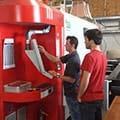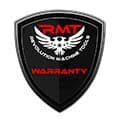The Quality of Goodness
The fabricator was looking through his fridge for a snack when his seven-year-old daughter walked into the family kitchen. “Dad,” she asked, “Is your shop a good shop?”
Startled, the fabricator quickly replied with a smile, “Of course it is a good shop, Sweetheart.”
When he turned to face her, the little girl looked him in the eyes and asked, “Why?”
He had to stop and think for a moment about what it really meant to be good. He then replied, “Well, I would say the shop I started is an honest business where my partner and I try to give quality service to our customers for a fair price. We treat our employees well, always pay our taxes, and even have it in our mission statement—our company rules—that we will show kindness to others, whether they are customers, vendors, or even competitors. I think all those things make us a good shop. Why do you ask?”
The girl replied, “My friend overheard her parents talking about some businesses being bad and I wanted to make sure that yours wasn’t like that.”
Giving his daughter a hug, he said, “They were probably talking about companies that aren’t always honest with their customers and I try extra hard to make sure that my business always is. Tell you what, why don’t I take you to my shop on Saturday and I can show you all the things we do to try and be a good shop—then go out for ice cream after?”
The daughter readily agreed, and the fabricator was left thinking about things he could do to try and make his shop even better than it already was.
The quality of goodness is something that all humans possess a concept of, even though they might have a hard time defining it. A person with moral integrity might be called “good,” while an idea that seems like it has a chance of working and producing positive results might also receive the same label.
Dozens of synonyms for “good” exist, and they range in meaning from just adequate to being of the highest order. They include acceptable, admirable, competent, excellent, exceptional, fine, great, magnificent, outstanding, pleasing, quality, satisfactory, splendid, super, superb, superior, and wonderful.
It almost might be easier to define goodness by what it is not: things that aren’t bad, negative, or mediocre are likely “good” things. To paraphrase United States Supreme Court Justice Potter Stewart, while we might not be able to precisely define goodness, we know it when we see it.
What Would You Look for in a Metal Fab Shop?
Metal fabrication shops play a crucial role in various industries, ranging from manufacturing and construction to automotive and aerospace. Being a good metal fabrication shop takes more than just technical expertise.
If you wanted to determine if the metal fabrication shop you own or manage would meet the criteria of being a “good shop,” the easiest method would be to simply ask yourself what you personally would look for when shopping around for a fabrication business. What specific characteristics would you want a fab shop to have for you to trust them with your important metalworking projects? Some possibilities might include the following:
- Customer Service. Providing exceptional customer service is key to building long-term relationships and securing repeat business. Understand and communicate effectively with clients to grasp their specific needs and preferences. Offer personalized solutions, provide transparent pricing, and promptly address any concerns or issues. A satisfied customer is likely to recommend your shop and become a loyal partner.
- Delivery. How does your shop handle on-time delivery? What metrics do you use to measure your on-time delivery rate and other factors, such as order accuracy? How do you handle orders that get delayed? Do you ever sacrifice quality of product to meet delivery deadlines?
- Equipment. Regardless of the talent of the fabricators on staff, without the right equipment on the shop floor, a metal fab business simply won’t measure up. Investing in modern and reliable equipment is vital for your shop to succeed. This includes CNC press brakes, high-performance shears, laser cutters, and other specialized tools. Continually adapting to technological advancements can significantly enhance the capabilities of your shop. Embrace computer-aided design (CAD) software for precise design and modeling, integrate automation and robotics for repetitive tasks, and explore advanced welding techniques. By embracing innovation, your shop can stay competitive and offer cutting-edge solutions to clients.
- Project Management. Efficient project management plays a pivotal role in meeting customer expectations and delivering projects on time. Establishing clear communication channels, setting realistic deadlines, and closely monitoring progress are crucial. Utilizing project management software and assigning dedicated project managers can streamline workflows and minimize delays, ensuring client satisfaction.
- Quality Control. Maintaining strict quality control measures is imperative for a reputable metal fabrication shop. Implementing comprehensive quality assurance protocols throughout the fabrication process helps identify and rectify any defects or inconsistencies. By adhering to industry standards and certifications, such as ISO 9001, your shop can assure customers of the highest quality products.
- Safety. Maintaining a safe working environment is crucial in a metal fabrication shop. Establish comprehensive safety protocols, provide proper safety training to employees, and regularly inspect equipment and machinery for any potential hazards. Prioritizing safety not only protects your workforce but also enhances productivity and reduces costly accidents or disruptions.
- Staff. At the heart of any metal fabrication shop are skilled and knowledgeable craftspeople. Hiring and retaining talented individuals with expertise in a variety of metalworking techniques—such as bending, rolling, cutting, welding, and assembling—is essential. Workers who are certified in specific skills should be sought out. Continual training and development programs can help the workforce stay updated with the latest industry advancements, ensuring high-quality fabrication.
- Supplier Relationships. Establishing strong relationships with reliable suppliers is essential for a metal fabrication shop. A steady supply of high-quality raw materials and components is critical to meet project requirements. Regular communication, timely deliveries, and negotiating favorable terms can help maintain a seamless supply chain, reducing production delays and costs.
Becoming the Right Metal Fabrication Partner for Your Customers
To thrive as a metal fabrication shop, you need to be seen by your customers as much more than a simple vendor. They need to think of you as a trusted partner, someone they rely on to help them succeed. How do you give them that perception? Simple. Become their trusted partner. At the end of the road, you can only succeed as a fabricator if your customers themselves succeed, then turn to you again and again for more projects as the years go by.
Care about your customers, make their problems your problems, and establish long-term relationships with them. When they see that you take a vested interest in their success and have essentially become an extension of their business, they will not only keep work coming your way, but won’t hesitate to recommend you to their friends and business acquaintances. When requests for quotes from new customers start arriving in droves because of word-of-mouth recommendations from existing customers, that’s a sign that you are well on your way to being a good metal fabrication shop.







